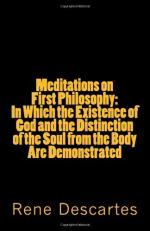Moreover, it has been proved that matter cannot be either infinite or eternal; and, therefore, there must be supposed both a first atom (by which motion must have begun at a precise moment), and a first concourse of atoms (that must have formed the first combination). Now, I ask what mover gave motion to that first atom, and first set the great machine of the universe a-going? It is not possible to elude this home question by an endless circle, for this question, lying within a finite circumference, must have an end at last; and so we must find the first atom in motion, and the first moment of that first motion, together with the first mover, whose hand made that first impression.
Sect. LXXXII. No Law of Motion has its Foundation in the Essence of the Body; and most of those Laws are Arbitrary.
Among the laws of motion we must look upon all those as arbitrary which we cannot account for by the very essence of bodies. We have already made out that no motion is essential to any body. Wherefore all those laws which are supposed to be eternal and immutable are, on the contrary, arbitrary, accidental, and made without cogent necessity; for there is none of them that can be accounted for by the essence of bodies.
If there were any law of motion essential to bodies, it would undoubtedly be that by which bodies of less bulk and less solid are moved by such as have more bulk and solidity. And yet we have seen that that very law is not to be accounted for by the essence of bodies. There is another which might also seem very natural—that, I mean, by which bodies ever move rather in a direct than a crooked line, unless their motion be otherwise determined by the meeting of other bodies. But even this rule has no foundation in the essence of matter. Motion is so very accidental, and super-added to the nature of bodies, that we do not find in this nature of bodies any primitive or immutable law by which they ought to move at all, much less to move according to certain rules. In the same manner as bodies might have existed, and yet have never either been in motion or communicated motion one to another, so they might never have moved but in a circular line, and this motion might have been as natural to them as the motion in a direct line. Now, who is it that pitched upon either of these two laws equally possible? What is not determined by the essence of bodies can have been determined by no other but Him who gave bodies the motion they had not in their own essence. Besides, this motion in a direct line might have been upwards or downwards, from right to left, or from left to right, or in a diagonal line. Now, who is it that determined which way the straight line should go?
Sect. LXXXIII. The Epicureans can draw no Consequence from all their Suppositions, although the same should be granted them.




